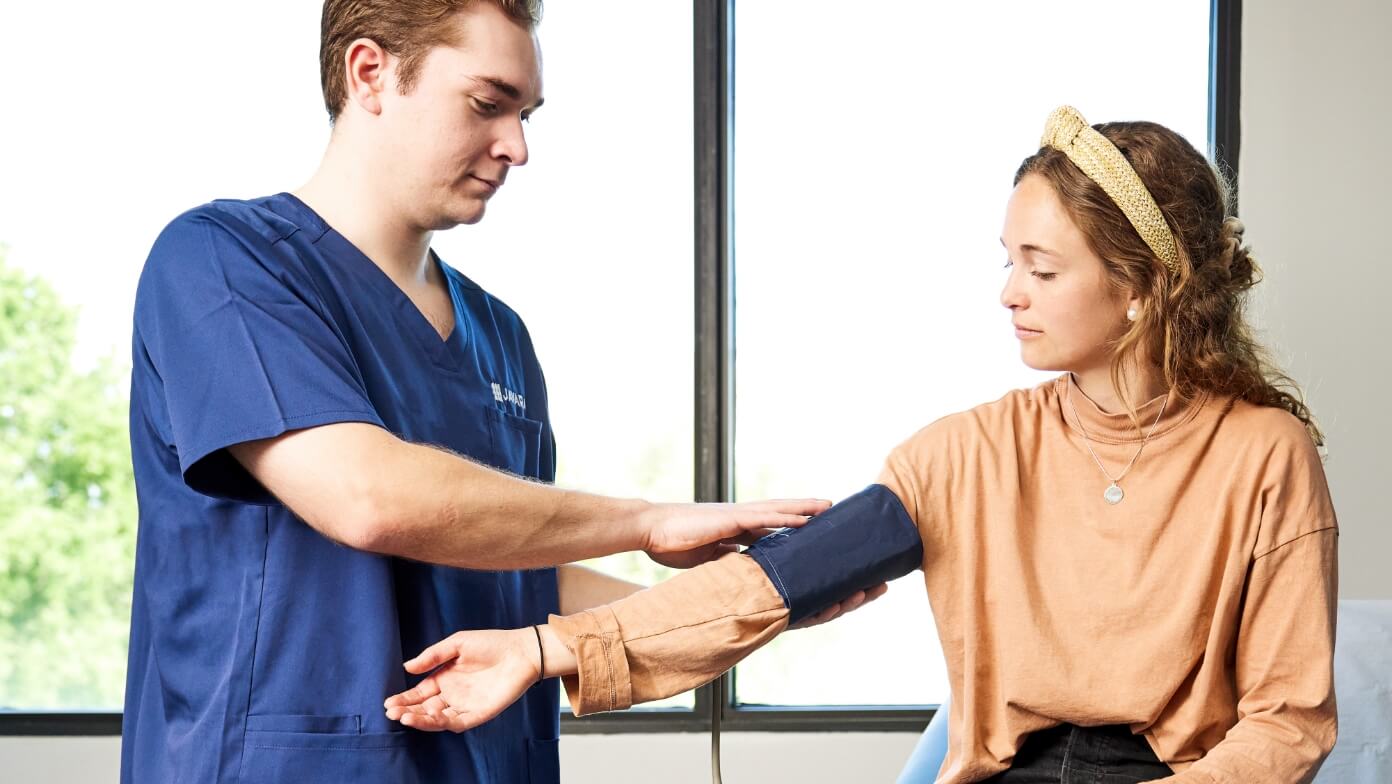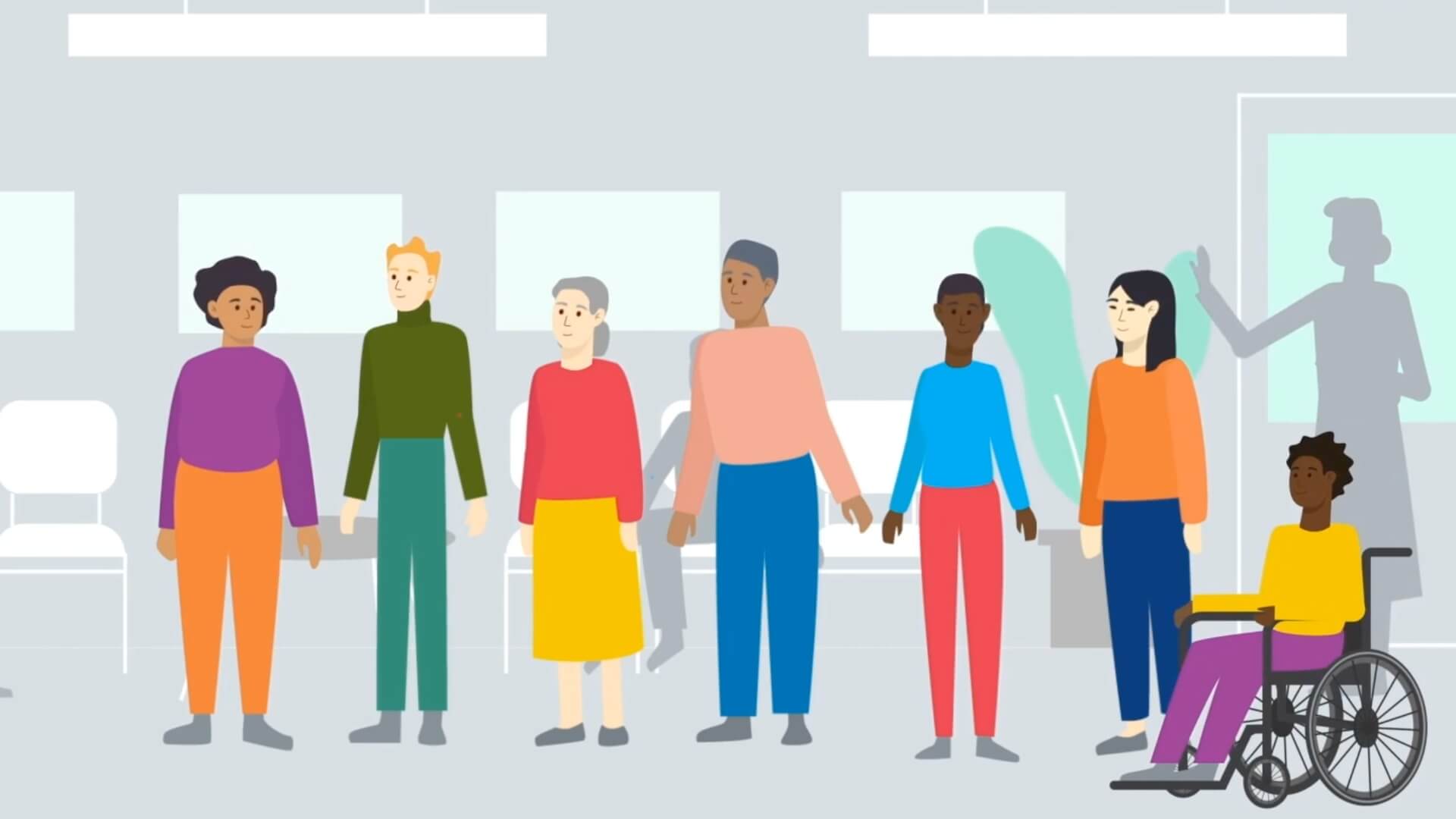Reference:
*Shen J, Buechler A, Byrne J, et al. PMG Research. Clinical research participation as a care option: Driving patient experience and satisfaction. 2015. Access the report. Accessed Sept 1, 2021.
Advantages of Clinical Research Participation

Access to new care options
Clinical trials give patients early access to cutting-edge innovations, giving you additional options to consider.

Personalized experience from your trusted care team
Throughout the clinical trial, you’ll have the support of a team dedicated to your clinical research journey as well as your overall health and wellbeing.

Lower healthcare costs – even if you’re uninsured
Clinical trials are often offered at no cost for patients, and you may even be compensated for your time and travel expenses.

The opportunity to make an impact
Clinical research takes years. By participating in a clinical trial, you’ll make a lasting difference for generations to come.
Patient Testimonials
Carousel items
-

As an African American woman, many of those closest to me are hesitant about research. I use my experience to encourage them, highlighting the importance of our contributions.
Michelle Bennett Huntersville, NC
READ THE FULL STORY -

I would absolutely recommend others’ to consider participating in a clinical trial, if not for one’s own health, certainly from the point of view of helping humanity.
William "Bill" Drury Charlotte, NC
READ THE FULL STORY -

My primary motivation for participating was rooted in the realization that I could do something – anything at all.
Theresa Bauer-Brown Charlotte, NC
READ THE FULL STORY -

They were wheeling me into the ICU, that’s all I remember, when I heard a female voice next to me; ‘Tony,’ she whispered, ‘I need you to do one thing for me...’ ‘What’s that,’ I asked. ‘I need you to fight.'
Tony Perry Charlotte, NC
READ THE FULL STORY -

I experienced histoplasmosis as a child, and with a son diagnosed with MS at such a rare, young age, we are both more susceptible to viruses such as RSV. To have the opportunity to help advance preventative measures to protect us all against the disease was meaningful.
Melissa McAtee Charlotte, NC
READ THE FULL STORY -

My PCP, Dr. Moriarity, was a principal investigator for the trial. He presented the opportunity to me and encouraged me to consider participating. Compensation, as a young adult, was definitely an incentive for me, paired with the withstanding need to receive my annual flu shot.
Hannah Russell Savannah, GA
READ THE FULL STORY -

We want to be part of the solution and not on the sidelines.
John Reeves Charlotte, NC
READ THE FULL STORY
Carousel items
-
95%*
of patients agree that adding clinical research significantly or somewhat improved their overall quality of care
-
90%
of patients surveyed said they would participate in another trial with Javara
-
95%
of patients surveyed by Javara would recommend clinical trial research to their friends and family
Additional Resources
A video is being shown
A video is being shown
A video is being shown
A video is being shown
A video is being shown
Worried about getting to your appointments?
Javara partners with Uber Health to provide prepaid patient transportation to study visits to make clinical research more convenient.
Uber Health
Frequently Asked Questions
-
Clinical research is how we get new therapies, devices and medications to the general public. Clinical trials test the safety and effectiveness of the medicines and devices created by biopharmaceutical companies. The Food and Drug Administration (FDA) approves all medicines and devices before they become available to consumers.
-
Clinical research can benefit you in the near-term, as well as help others in the future. By participating in clinical trials, you receive highly attentive care, including diagnostic assessments that may not otherwise be available. Your cost of care can be offset, and your treatment could potentially lead to improved health outcomes.
Results from clinical trials help determine if a medicine or medical device is ready to go to market, or if it needs more testing. As a patient, you have an opportunity to contribute to medical advancements simply by participating in clinical research.
-
Each clinical trial has different eligibility requirements relevant to the scope and purpose of the trial. Patients of all ages, racial and ethnic groups are needed for clinical trials. Diversity of participants is important to ensure the results can be applied to our diverse population.
-
It depends on the trial and what the pharmaceutical company has approved. It does not cost the participant any money to participate in a clinical trial. Some clinical trial sponsors will pay for participants’ travel costs. Javara partners with Uber Health to provide prepaid patient transportation to study visits to make clinical research more convenient. Participants do not need insurance to participate in a clinical trial.
-
While studies have strict protections, there is always a balance of risk and reward to any clinical study. Be sure to discuss your concerns with the research study team as well as your physician. If you decide to enroll in a trial, you will receive all the information necessary to give permission prior to any procedure or treatment. The informed consent documents also include a description of the procedure or treatment, potential risks or benefits, probable duration of any incapacitation, and alternatives.
-
The research study team should be able to tell you the details of the trial schedule if you are considering taking part in a clinical trial. The duration of some trials may last a few years, but the number of visits may only be a few times per year. For other trials, participants may need to visit more frequently or keep a journal between visits. Consider the benefits of participation versus how much time you may need to devote. Learn how long each study visit will take and what you’ll be doing during your visit from the study team.
-
Health insurance plans are required by federal law to cover routine patient care costs in clinical trials if certain conditions are met. These conditions include:
- Trial participants must meet certain eligibility requirements.
- Clinical trials must be approved.
- Out-of-network doctors and hospitals are not included in the trial if your insurance plan does not cover out-of-network care.
Additionally, most health plans cannot deny you benefits or refuse to let you participate in an approved clinical trial. (source cancer.gov)
-
Through clinical trial phases, new treatments are evaluated for risk and effectiveness. Researchers must include individuals from all backgrounds to develop medicines, treatments, and medical devices that work for everyone. Clinical trials offered by Javara are in Phase II and III.
Phase I trials: Researchers test a drug or treatment in a small group of people (20–80) for the first time. The purpose is to study the drug or treatment to learn about safety and identify side effects.
Phase II trials: The new drug or treatment is given to a larger group of people (100–300) to determine its effectiveness and to further study its safety.
Phase III trials: The new drug or treatment is given to large groups of people (1,000–3,000) to confirm its effectiveness, monitor side effects, compare it with standard or similar treatments, and collect information that will allow the new drug or treatment to be used safely.
Phase IV trials: After a drug is approved by the FDA and made available to the public, researchers track its safety in the general population, seeking more information about a drug or treatment’s benefits, and optimal use.
-
At Javara, we partner with local practices to provide clinical trials through your trusted physician. Depending on the study and your location, appointments could take place within the physician’s office or in a nearby Javara clinic. Find out what clinical trials are available near you.













